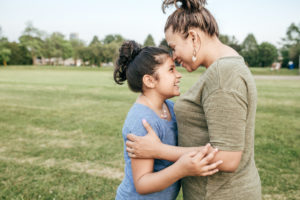 In my office, I hear angry parents snap in frustration at their kids. “You broke my trust!” “You have to earn my trust back!” “You’ve got to rebuild my trust!”
In my office, I hear angry parents snap in frustration at their kids. “You broke my trust!” “You have to earn my trust back!” “You’ve got to rebuild my trust!”
These parents are confused and overwhelmed. Most of them mean, “I feel hurt,” “I feel betrayed,” or “I’m disappointed.” Some mean, “I’m not responsible for my feelings, you are!” A few, who parent by retaliation, mean, “You upset me, so now I’m going to show you how it feels!”
Trust is an emotion, just like love, happiness, or sadness. “You need to rebuild my happiness,” “You broke my joy,” or “You have to earn my love back” would all obviously sound like making someone else responsible for your feelings. In my experience, it often seems harder for parents to be responsible for their own feelings of trust or mistrust than other emotions.
Because no one can truly be responsible for another person’s feelings, these parents are demanding that a child do something that is impossible to do. Trying to win their parents’ approval by controlling their emotions places a child in an impossible position. They want their parents to love them, yet there is no way to make someone else feel an emotion or to be responsible for another person’s feelings. A child who is continuously placed in this catch-22 learns they can never really earn the love and respect they desire from their parents. They learn the hopeless lesson of trying to make other people feel the way they want them to feel.
On the other hand, parents who model taking personal responsibility for their own feelings teach children how to manage their own emotions without blaming others for how they feel. Consider: “I’m very disappointed you came home past your curfew. I trusted that you would keep your word. For me to feel trust again, I need to set some boundaries. You can count on me to take 10 minutes off your curfew next weekend for every 5 minutes you come home late. So next Saturday night you have to come in 30 minutes earlier.” (Notice the boundary is for the parent—what THEY can be counted on to do, not the child.)
When parents give away responsibility for their feelings, including their trust and mistrust, they model for their children that they, too, can blame others for their feelings.
Rebuilding your feelings of trust in a child requires setting boundaries for yourselves as parents: “I can be counted on to check your homework online every day and to give you the privilege of the Wi-Fi password if it has all been turned in.” “I’m comfortable with you going to your friend’s home after I talk to her parent.” “I will give you permission to take the car after your drug test comes back negative.” “I promise to drive you to the skate park after you’ve kept your room clean for one week.”
When parents give away responsibility for their feelings, including their trust and mistrust, they model for their children that they, too, can blame others for their feelings. Such parents are also more likely to use shame, guilt, and scolding to try to get their kids to comply with their request. These same parents are often surprised when these tactics are turned back on them by their children. (And when kids blame, scold, and shame their parents for how they feel, it generally sounds less polished and more crude.)
Say what you mean: “I’m disappointed,” “I’m surprised,” “I’m angry.” Then mean what you say: “You can count on me to ______ when I see that you have ______.” Don’t elaborate, lecture, or shame. There’s nothing to be gained in belittlement.
Raising children is difficult. As they grow and individuate, you are likely to experience feelings of surprise, shock, disbelief, even betrayal. None of these emotions is pleasant or comfortable, but all of them represent opportunities to model for your kids how to take responsibility for their own uncomfortable feelings. Knowing you can trust yourself to extend only those privileges that you are comfortable giving may be the best way to reclaim trust you’ve lost.

The preceding article was solely written by the author named above. Any views and opinions expressed are not necessarily shared by GoodTherapy.org. Questions or concerns about the preceding article can be directed to the author or posted as a comment below.

 Addiction: The Latest Plague Stealing Our Children
Addiction: The Latest Plague Stealing Our Children The Importance of Repair Attempts in Parent-Child Conflicts
The Importance of Repair Attempts in Parent-Child Conflicts Disciplining Young Children: Why Simply Saying No Isn’t the Answer
Disciplining Young Children: Why Simply Saying No Isn’t the Answer

Please fill out all required fields to submit your message.
Invalid Email Address.
Please confirm that you are human.
Leave a Comment
By commenting you acknowledge acceptance of GoodTherapy.org's Terms and Conditions of Use.